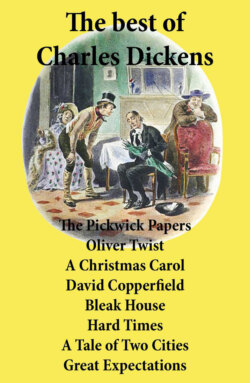Читать книгу The best of Charles Dickens: The Pickwick Papers, Oliver Twist, A Christmas Carol, David Copperfield, Bleak House, Hard Times, A Tale of Two Cities, Great Expectations: All Unabridged - Charles Dickens - Страница 67
На сайте Литреса книга снята с продажи.
CHAPTER LI. IN WHICH Mr. PICKWICK ENCOUNTERS AN OLD ACQUAINTANCE, TO WHICH FORTUNATE CIRCUMSTANCE THE READER IS MAINLY INDEBTED FOR MATTER OF THRILLING INTEREST HEREIN SET DOWN, CONCERNING TWO GREAT PUBLIC MEN OF MIGHT AND POWER
ОглавлениеTable of Contents
The morning which broke upon Mr. Pickwick’s sight at eight o’clock, was not at all calculated to elevate his spirits, or to lessen the depression which the unlooked-for result of his embassy inspired. The sky was dark and gloomy, the air was damp and raw, the streets were wet and sloppy. The smoke hung sluggishly above the chimney-tops as if it lacked the courage to rise, and the rain came slowly and doggedly down, as if it had not even the spirit to pour. A gamecock in the stableyard, deprived of every spark of his accustomed animation, balanced himself dismally on one leg in a corner; a donkey, moping with drooping head under the narrow roof of an outhouse, appeared from his meditative and miserable countenance to be contemplating suicide. In the street, umbrellas were the only things to be seen, and the clicking of pattens and splashing of raindrops were the only sounds to be heard.
The breakfast was interrupted by very little conversation; even Mr. Bob Sawyer felt the influence of the weather, and the previous day’s excitement. In his own expressive language he was ‘floored.’ So was Mr. Ben Allen. So was Mr. Pickwick.
In protracted expectation of the weather clearing up, the last evening paper from London was read and re-read with an intensity of interest only known in cases of extreme destitution; every inch of the carpet was walked over with similar perseverance; the windows were looked out of, often enough to justify the imposition of an additional duty upon them; all kinds of topics of conversation were started, and failed; and at length Mr. Pickwick, when noon had arrived, without a change for the better, rang the bell resolutely, and ordered out the chaise.
Although the roads were miry, and the drizzling rain came down harder than it had done yet, and although the mud and wet splashed in at the open windows of the carriage to such an extent that the discomfort was almost as great to the pair of insides as to the pair of outsides, still there was something in the motion, and the sense of being up and doing, which was so infinitely superior to being pent in a dull room, looking at the dull rain dripping into a dull street, that they all agreed, on starting, that the change was a great improvement, and wondered how they could possibly have delayed making it as long as they had done.
When they stopped to change at Coventry, the steam ascended from the horses in such clouds as wholly to obscure the hostler, whose voice was however heard to declare from the mist, that he expected the first gold medal from the Humane Society on their next distribution of rewards, for taking the postboy’s hat off; the water descending from the brim of which, the invisible gentleman declared, must have drowned him (the postboy), but for his great presence of mind in tearing it promptly from his head, and drying the gasping man’s countenance with a wisp of straw.
‘This is pleasant,’ said Bob Sawyer, turning up his coat collar, and pulling the shawl over his mouth to concentrate the fumes of a glass of brandy just swallowed.
‘Wery,’ replied Sam composedly.
‘You don’t seem to mind it,’ observed Bob.
‘Vy, I don’t exactly see no good my mindin’ on it ‘ud do, sir,’ replied Sam.
‘That’s an unanswerable reason, anyhow,’ said Bob.
‘Yes, sir,’ rejoined Mr. Weller. ‘Wotever is, is right, as the young nobleman sweetly remarked wen they put him down in the pension list ‘cos his mother’s uncle’s vife’s grandfather vunce lit the king’s pipe vith a portable tinder-box.’ ‘Not a bad notion that, Sam,’ said Mr. Bob Sawyer approvingly.
‘Just wot the young nobleman said ev’ry quarter-day arterwards for the rest of his life,’ replied Mr. Weller.
‘Wos you ever called in,’ inquired Sam, glancing at the driver, after a short silence, and lowering his voice to a mysterious whisper — ‘wos you ever called in, when you wos ‘prentice to a sawbones, to wisit a postboy.’
